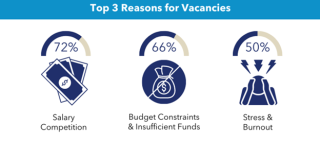The National Council of Nonprofits (NCN) released 2023 Nonprofit Workforce Survey Results: Communities Suffer as the Nonprofit Workforce Shortage Crisis Continues, detailing the continuing challenges nonprofits face in hiring and retaining staff to serve their communities.
Three-quarters (74.6%) of the 1,600-plus nonprofits responding to a nationwide survey reported current job vacancies, based on a survey conducted in April 2023 by the networks of the National Council of Nonprofits. Half (51.7%) reported more vacancies in April 2023 compared to March 2020. More than a quarter (28%) reported a longer waiting list for services than before the Covid-19 pandemic began.

Salary competition, budget constraints, and stress/burnout were the top factors cited by nonprofits regarding their inability to recruit and retain employees. Further complicating the ability of charitable nonprofits to keep up with salary demands, 70.5% reported anticipating charitable giving will decrease or remain flat this year – a critical concern since giving declined significantly in 2022.
“The workforce shortages that continue to weaken nonprofits create consequences that harm people in local communities throughout the country,” said Tim Delaney, President & CEO of NCN. “It’s basic economics: when the costs for a nonprofit to meet the public’s increasing needs for services are greater than a nonprofit’s revenues because governments hiring nonprofits to deliver services won’t pay the full costs that nonprofits incur and government policies undercut charitable contributions, which have been plummeting, then nonprofits simply can’t keep up. Making matter worse is that, when big companies offer higher wages and signing bonuses to hire away a nonprofit employee, there’s no way for nonprofits to compete. That employee’s workload then gets piled onto remaining employees, thus burning them out and fueling the downward spiral of shortages. Policymakers need to pay attention and improve policies before nonprofits collapse.”
“To put it bluntly, a shortage of workers at a fast food drive-thru or at the Department of Motor Vehicles means an inconvenience,” said David L. Thompson, NCN’s Vice President of Public Policy. “But a workforce shortage at a nonprofit means people who are not receiving vital, sometimes lifesaving, services like food to eat or a bed to sleep in. Solutions exist to these issues. We need our partners in government to take notice of this shared challenge and step up. At the federal level this means passing bipartisan legislation to advance grants reforms and improve charitable giving tax incentives. Our communities are counting on it.”
###
Communities thrive when nonprofits succeed. For more than 30 years, the National Council of Nonprofits has mobilized the largest network of nonprofits in the United States to achieve transformative results. We champion, connect, and inform nonprofits across the country. Join our collective efforts to ensure a connected and powerful nonprofit community equipped to champion the public good. Learn more at www.councilofnonprofits.org.
